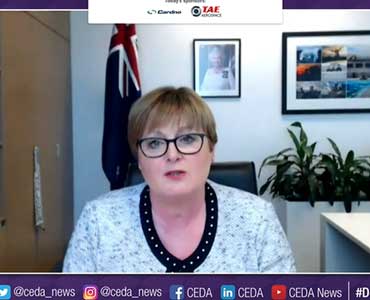Federal Minister for Defence, Senator the Hon. Linda Reynolds, and Federal Minister for Defence Industry, the Hon. Melissa Price, spoke about recent changes to Australia’s defence policy and the continued importance of defence to the Australian economy during COVID-19.
 Ms Reynolds spoke about some of the challenges she has faced in her fifteen months in the role of Federal Minister for Defence.
Ms Reynolds spoke about some of the challenges she has faced in her fifteen months in the role of Federal Minister for Defence.
“We have had a strategic review, we still have over 2000 troops overseas during COVID, and we have had two very large domestic humanitarian response disasters here in Australia in the bushfires and COVID-19,” she said.
Ms Reynolds discussed the Federal Government’s recent update to defence policy that builds upon the 2016 Defence White Paper, taking into account changes in the strategic environment since that document was published.
“Since the release of the 2016 white paper, the strategic challenges we identified in that paper have accelerated faster than we anticipated in 2016,” she said.
“Major power competition, military modernisation, grey zone challenges, and disruptive technological advances and how they are being adopted globally and in our region. COVID-19 is accelerating these trends even further and they are being exploited to some extent in our region.”
She detailed some of the recent changes to defence policy.
“In 2016 we set three equally weighted goals for defence: territorial defence, regional defence, and global defence. That was appropriate in a more benign strategic environment but what we are seeing in our region now requires a much sharper focus,” she said.
“So we have set three new effects-based objectives for defence: shaping, deterring and responding. Our objectives are now about the effects we need to generate for our nation’s defence rather than geographic considerations.”
Ms Reynolds also discussed the recent addition of two new domains to the military portfolio: cyber and space.
“Both of these areas now reflect a very immediate and very clear threat to our nation in a way that wasn’t as apparent in 2016,” she said.
Ms Reynolds spoke about the recently secured funding arrangements for Australian defence.
“We have locked in the next ten years of expenditure for the defence budget and also the defence capability which is $270 billion, which fully funds what we had announced in the 2016 white paper. This is critically important for defence planning and the Australian defence industry,” she said.
Ms Reynolds noted that the policy still identifies America as Australia’s “number one key strategic partnership,” and acknowledges “the ongoing importance of the United States’ role in our region, particularly in the Pacific, in ensuring peace and stability over the last few decades.”
She also emphasised that the policy “is not focused on any one country” and that “we do recognise the importance of Australia’s bilateral relationship with China.”
Federal Minister for Defence Industry, the Hon. Melissa Price, stressed the economic importance of Australia’s defence investment.
“Many tens of thousands of Australians are already employed across the defence industry in at least 15,000 companies, and some 70,000 Australians are benefiting from our investment in defence,” she said.
“All too often people say manufacturing is well and truly dead in Australia but what I say to them is that they are not looking closely enough at defence industry or what I call defence manufacturing.”
Ms Price discussed the role her portfolio has played in sustaining the economy during COVID-19.
“There’s no doubt that we have been fostering much stronger ties between industry and government during the COVID-19 period to make sure we can deliver and sustain those defence capabilities highlighted in the 2020 defence update and structure plan,” she said
“During COVID, we have consciously shifted gear to enhance the opportunities available to Australian business, exploring better ways to advocate and support local business.”
She discussed the Government’s early payment of invoices to defence companies, saying that the decision saved “thousands and thousands of Australian jobs” during the COVID-19 crisis.